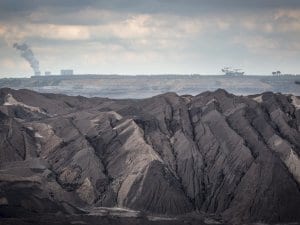People around the world are trapped in a “toxic triangle” of short-term financial investors, timid governments and fossil fuel companies, which threatens to push up global temperatures, putting 400 million people at risk of hunger and drought by 2060, Oxfam warns today.
Toxic Triangle

People around the world are trapped in a “toxic triangle” of short-term financial investors, timid governments and fossil fuel companies, which threatens to push up global temperatures, putting 400 million people at risk of hunger and drought by 2060, Oxfam warns today.
Oxfam’s new report Food, Fossil Fuels and Filthy Finance shows that at current rates, US$6 trillion will be spent by fossil fuel companies to develop the industry over the next decade. Investment in fossil fuels is propped up by a concoction of tax breaks, government incentives and an estimated US$1.9 trillion of subsidies a year oiling the wheels of the industry and paying for the social, health and environmental damage it causes. These subsidies are protecting investment levels despite the growing business risk.
Investing in fossil fuels is flawed
Oxfam says that investing in fossil fuels is flawed. Without effective regulation, economies will suffer as governments are forced to cover the costs of climate change and businesses lose revenue because of extreme weather. With effective regulation that limits warming to 2°C, US$300 billion of fossil fuel assets could be stranded, bursting the “carbon bubble” and leaving investors out of pocket. This is because only one fifth of carbon reserves currently held by companies listed on stock exchanges can ever be burned to avoid warming of more than 2°C, the temperature limit agreed to by all governments at the United Nations.
Oxfam New Zealand’s Policy Advisor Luke Roughton said, “The fossil fuel industry is benefitting from a toxic triangle it has constructed that is trapping us in a warming world. Continuing to look for new reserves and dig them up for short-term profit is simply not responsible.”
Fossil fuels are the source of 80 per cent of carbon dioxide emissions, putting health, property, food, businesses and economic growth at risk. The world is currently on track to warm by between 4°C and 6°C by the end of the century, which would leave up to 400 million of the world’s poorest at risk of severe hunger and drought by 2060.
Roughton said, “In the Pacific, climate change isn’t just a far-off risk that could cause people to relocate in the future – worsening floods, droughts and saltwater intrusion are making it harder for families to feed themselves right now. The New Zealand Government and the private sector could do far more to be part of the solution, instead of exacerbating the problem.”
Divestment from fossil fuel companies is quickly ramping up. Hundreds of universities, cities, counties, churches and foundations have pulled their money out of fossil fuels. Recently, the Presbyterian Church of Aotearoa New Zealand voted to divest its funds from coal, oil and gas, the University of Glasgow became the first university in Europe to do the same, and the Rockefeller family heirs to the Standard Oil fortune withdrew US$50 billion from fossil fuel investments because of climate change concerns. And this week a Sustainable Business Network survey showed large-scale demand for better Kiwisaver options, with over 80 per cent of people claiming they would avoid investing in gambling, pornography and fossil fuels if they had the opportunity.
Shift to low-carbon future
- Shift their investment from dirty energy to renewables, energy efficiency and ensuring that the poorest people are not left behind in terms of accessing energy.
- Commit to climate proof the global financial system by reviewing risk, improving transparency and providing capital for low carbon investment.
- Fossil fuel and energy-intensive companies to shift and diversify their business models to embrace a low-carbon future and become part of the solution.
- Investors to shift their investment from fossil fuels to low-carbon development and challenge companies that are pursuing high-carbon strategies.



